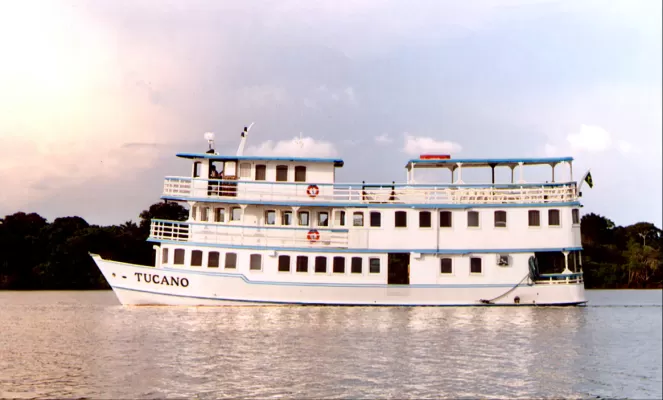The company's voyages offer comfortable and elegant accommodations, with a focus on providing exceptional experiences rather than luxury accommodations or fine dining. The emphasis is on the sophistication of the narrative, the storytelling, the forest activities, and the authenticity of the overall experience. Their vessel is designed to deliver outstanding and extraordinary experiences, with comfortable but not overly extravagant accommodations. They cater to a discerning clientele, aiming to provide a sophisticated and elegant shipboard experience and an exceptional field experience at a reasonable price.
The cruises are designed to be active and engaging, yet they also offer relaxation options to suit the preferences of their guests. The company navigates the M/Y Tucano primarily during the middle of the day and at night, allowing ample time for off-vessel exploration in the rainforest. Travelers can choose between active programs, which include several hours of daily exploration, including optional kayak excursions deep into the flooded forest, and more leisurely but engaging experiences. Being on the vessel itself is a unique experience, as it is surrounded by the wild rainforest.
In terms of wildlife encounters, the Amazon's incredible biodiversity ensures that travelers see various types of animals during the cruises. However, it's important to note that they may only spot a small number of each species, as the creatures are spread throughout the forest and often hide from human presence. Binoculars are often needed for close observations. These are truly wild creatures, not semi-captive animals typically found in forest lodges or hotels. The company's cruises typically spot a wide variety of creatures due to the expertise of their guides, small group sizes, numerous excursions, the remote wilderness location, and their commitment to exploration. Travelers can expect to see around 100 different bird species, 3-6 kinds of monkeys, 5-10 different reptiles and amphibians, approximately 5 other types of mammals such as anteaters or otters, and a diverse array of fascinating plants.
The cruises are designed to be enjoyable and lighthearted, with a focus on experiencing Amazon nature. Activities include swimming off pristine beaches (weather and navigation permitting), fishing for piranha, and sampling local cuisine, such as the famous "caipirinhas" of Brazil, accompanied by music and dancing, including the Amazon's sizzling favorite, the forró.
Exploring the forest is a central focus of the cruises, with 3-5 excursions off the vessel every day. These voyages are not sedentary, and the nature portion of the journey primarily takes place outside the vessel. Activities include morning forest walks, daily excursions in launches or kayaks, and visits to small villages or pioneer families' homes. Some nights, weather permitting, there are excursions to observe nocturnal creatures from the safety of launches.
An important aspect of the M/Y Tucano cruises is that they offer travelers choices of activities. During daily excursions, travelers can select between two groups: the Science Group, which explores at a leisurely pace and focuses on detailed observations of Amazon flora and fauna, or the Adventure Group, which offers a more vigorous and exploratory experience through hiking or kayaking. This flexibility allows travelers with different interests and expectations to enjoy activities in their preferred manner and have a customized experience.
The best time to travel to the Amazon depends on individual preferences, as the diligence of guides, guests, and a bit of luck play a more significant role in wildlife observation than the specific travel timing. The company operates expeditions year-round, and trips are wonderful at any time of the year.
The company's voyages take place in the central Amazon in the State of Amazonas, Brazil. The region experiences less rainfall than the Peruvian end of the Amazon, with up to 30% less precipitation. The rainy season typically occurs from late January to early May, although full days of rain are rare. There are advantages to traveling during this season, including fruiting and flowering of riverine plants and slightly cooler temperatures.
The dry/low-water season lasts from September to November, during which rivers become shallower, and sandy beaches emerge. Afternoon rain showers are common during this period. It's an excellent time to spot large fishing birds, marine mammals, and reptiles like Caiman. The months of October and November are drier and hotter, corresponding to the lowest river levels of the year. While some creatures may be less abundant during the dry season, migratory species compensate for this. The itinerary may be adjusted during these months to navigate changing river channels and expansive beaches, reflecting the spirit of exploration. The cruises primarily travel in the middle of the day and at night, allowing for optimal exploration. Travelers have the opportunity to observe various creatures congregating at the river's edge, all while remaining comfortably connected to the surrounding forest. The river offers fascinating sights, including leaping fish, pink dolphins, numerous birds, and remarkable trees with hanging vines.



















